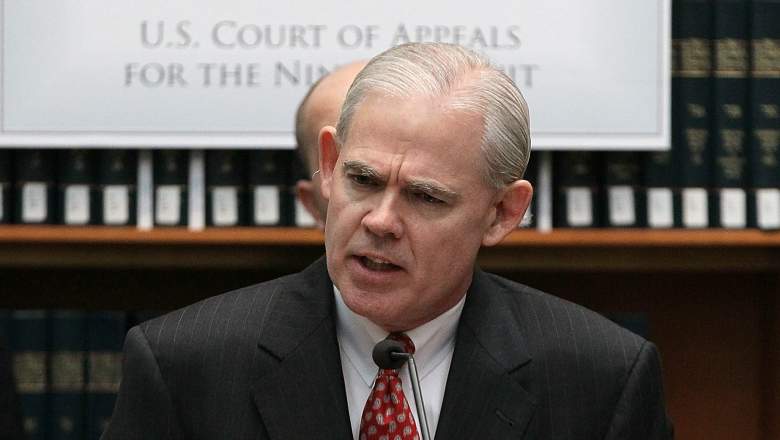
Charles Cooper, lead attorney for proponents of Proposition 8, speaks to reporters at a news conference following a hearing at the Ninth Circuit Court of Appeals on December 6, 2010. (Getty)
Charles “Chuck” Cooper, a leading candidate to be Donald Trump’s solicitor general, has now withdrawn his name from consideration.
That move, which came February 9, has increased speculation that George T. Conway, the husband of Trump’s high-profile adviser Kellyanne Conway, will get the post.
Cooper is a close friend of new Attorney General Jeff Sessions and has a background full of controversial legal opinions dating to the Reagan era.
In legal filings, Cooper has defended a university that wanted to ban interracial dating on the basis of religious freedom, sided with employers who wanted to fire employees with HIV, and fought for a proposition against gay marriage in California. For starters.
Politico described Cooper, a member of the conservative Federalist Society, as “one of the most prominent and aggressive Supreme Court litigators in the country.”
The Solicitor General argues the government’s cases (such as on Trump’s executive orders) in front of the U.S. Supreme Court and is sometimes called the “10th justice” because of the influence the position has with the nation’s highest court.
Here’s what you need to know:
1. Cooper Defended California’s Proposition 8, Barring Gay Marriage & Represented the Duke LaCrosse Team
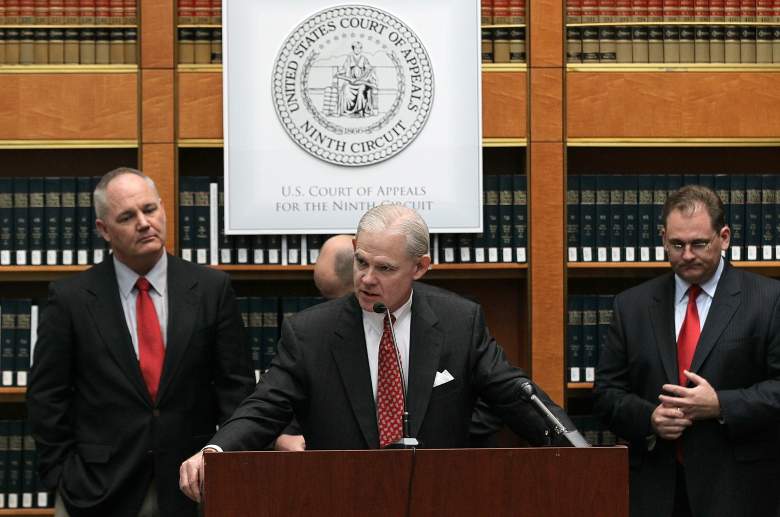
Charles Cooper, lead attorney for proponents of Proposition 8, speaks to reporters at a news conference. (Getty)
According to SCOTUS blog, “Cooper is perhaps best known for his defense of California’s Proposition 8, which barred same-sex marriage in that state.”
Yahoo News reports that Cooper has argued before the U.S. Supreme Court seven times, most recently “in 2013, when he unsuccessfully urged the court to uphold California’s 2008 voter initiative that banned same-sex marriage in the state.”
Cooper now says his position on gay marriage has “evolved,” reported Yahoo News, adding that “he helped plan his lesbian stepdaughter’s wedding a few years ago.”
The other leading candidate for Solicitor General is reportedly George T. Conway, Kellyanne Conway’s conservative lawyer husband. But recent reports point to Cooper.
Cooper’s law firm says it also handled the case of “39 of the members of the Duke lacrosse team in connection with civil litigation against Duke University and Durham.” A story from ABC 11 quotes Cooper as saying: “This lawsuit is born out of Duke and Durham’s sustained wrongdoing and callous conduct against the players.” The players were exonerated after being falsely accused of rape in a case with racially charged tensions.
Cooper was also described by ABAJournal as a “longtime NRA litigator.”
2. Cooper Was a Law Clerk to William Rehnquist & Worked in Ronald Reagan’s Justice Department
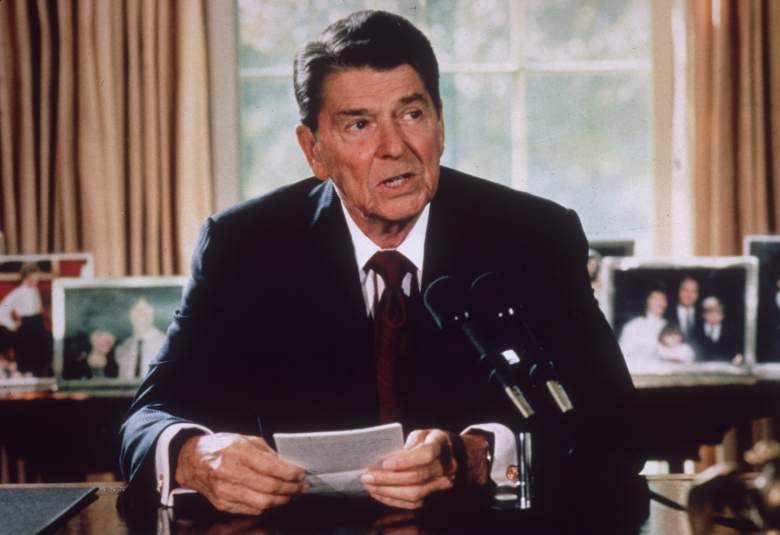
Ronald Reagan makes an announcement from his desk at the White House in 1985. (Getty)
Cooper once was a law clerk to conservative Supreme Court Chief Justice William Rehnquist. His law firm biography says he also served as law clerk to Judge Paul Roney of the Fifth (now Eleventh) Circuit Court of Appeals.
Cooper served as Assistant Attorney General for the Office of Legal Counsel under President Ronald Reagan. Cooper’s biography says, “Cooper joined the Civil Rights Division of the U.S. Department of Justice in 1981. In 1985 President Reagan appointed Mr. Cooper to the position of Assistant Attorney General for the Office of Legal Counsel. Mr. Cooper reentered private practice in 1988.”
Cooper received his law degree from the University of Alabama School of Law in 1977, where he was first in his class and editor-in-chief of the Alabama Law Review. He has a bachelor’s degree with honors from the University of Alabama School of Business Administration from 1974.
3. Cooper Is Jeff Sessions’ Close Friend & Has Been in Private Practice for Years
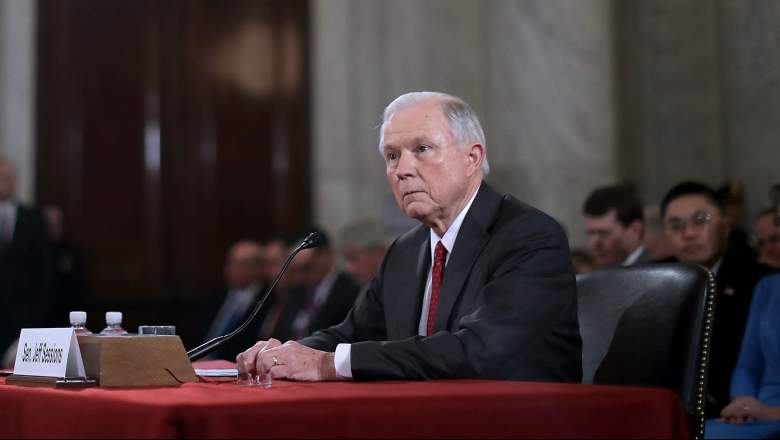
Sen. Jeff Sessions (R-AL) testifies before the Senate Judiciary Committee during his confirmation hearing to be the U.S. Attorney General. (Getty)
According to Politico, Cooper and Sessions have been friends since the 1980s when “the two Alabamans met in the Reagan Justice Department in the 1980s, when Cooper was assistant attorney general in the Office of Legal Counsel and Sessions was serving on an advisory committee to the attorney general.” According to Politico, Cooper helped Sessions get ready for his confirmation hearing as AG.
Yahoo News reported that Sessions wants Cooper for the job of Solicitor General, and Trump may let him choose.
Cooper once wrote an essay expressing adamant support for states’ rights, saying, “Congress has broad power to regulate, and even to subject states to generally applicable federal laws, but the power ends when it reaches too far into the retained dominion of state autonomy.”
Cooper is a founding member and chairman of Cooper & Kirk, PLLC. According to his law firm bio, Cooper’s practice is “national in scope and is concentrated in the areas of constitutional, commercial, and civil rights litigation. He is currently representing private clients in a variety of commercial cases, including antitrust, intellectual property, and contract disputes. Mr. Cooper also represents a number of state and local government bodies, as well as private clients, in a wide range of constitutional and federal statutory cases.”
Politico reports that Sen. Ted Cruz once worked at Cooper’s law firm, and Cooper assisted his campaign.
4. Cooper Signed a Brief Supporting Bob Jones’ University’s Efforts to Ban Interracial Dating
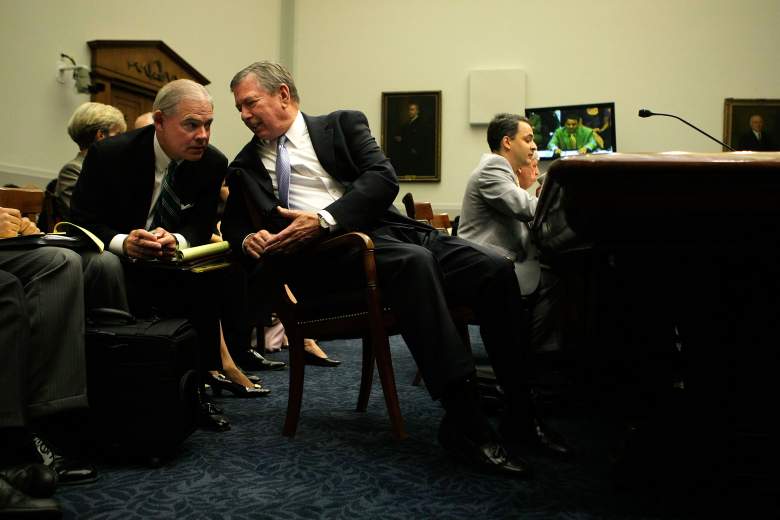
Former U.S. Attorney General John Ashcroft (R) listens to his attorney Charles Cooper (L) during a hearing before the House Judiciary Committee on Capitol Hill July 17, 2008 in Washington, DC. The hearing was focused on “From the Department of Justice to Guantanamo Bay: Administration Lawyers and Administration Interrogations Rules.” (Photo by Alex Wong/Getty Images)
The Bob Jones case dates to the Reagan era. According to Esquire, Bob Jones University is a Christian college in South Carolina that banned interracial dating “for what the university claimed were Biblical grounds.”
As a result, the IRS stripped its tax exemption status for religious discrimination in the 1970s (along with a North Carolina school.) The Reagan Justice Department defended the schools on religious liberty grounds and lost 8-1 at the U.S. Supreme Court, according to Esquire. Only Rehnquist dissented.
SCOTUS blog reports that Cooper “signed a brief on behalf of the federal government supporting Bob Jones University” in that case.
Cooper was also the attorney for then Attorney General John Ashcroft in Guantanamo Bay interrogation controversies.
5. Cooper Once Argued That Employers Should Be Able to Reject Job Applications with HIV
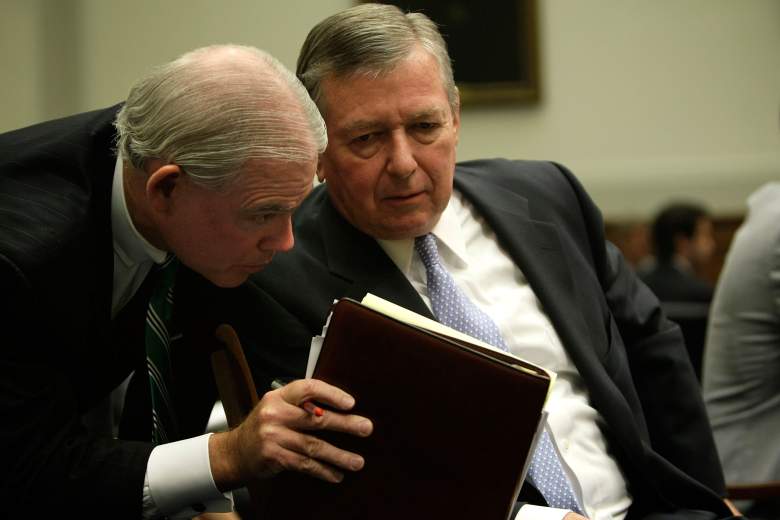
Former U.S. Attorney General John Ashcroft (R) listens to his attorney, Charles Cooper (L) during a hearing before the House Judiciary Committee on Capitol Hill July 17, 2008 in Washington, DC. (Getty)
SCOTUS Blog reports that Cooper, in 1986, as the head of the Office of Legal Counsel for Reagan, “signed an OLC opinion that argued that employers could reject job applicants with AIDS if they were concerned about contracting the disease.”
Yahoo News describes that legal opinion as “his 1986 argument, while in the Office of Legal Counsel, that the federal government could reject job candidates with AIDS out of fear of contagion.”
Cooper’s private law firm has handled a range of controversial cases, including representing school boards in desegregation cases, the National Rifle Association in various cases, and Jeb Bush in a case involving felon voting.
